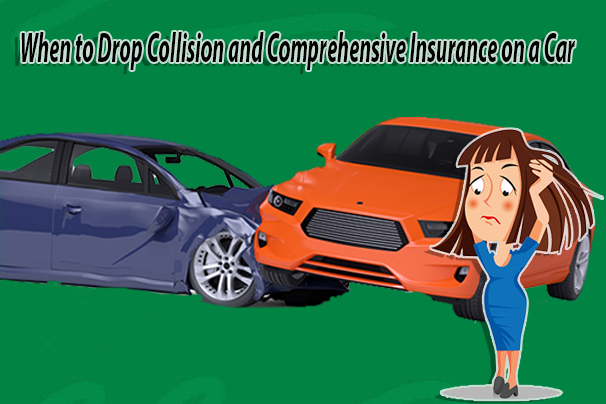When to Drop Collision and Comprehensive Insurance on a Car? You often don’t have a lot of options when it comes to purchasing specific forms of car insurance coverage if you own a car and drive on public roads. You may need to get liability auto insurance, uninsured motorist coverage, and even personal injury protection, depending on your state’s requirements.

To cover repairs in case of car damage due to fire, floods, or accident, consider getting collision and comprehensive insurance. Moreover, this is typically necessary if you have a car loan or lease. However, as your car ages and loses value, you may question if it’s appropriate to drop collision and comprehensive insurance.
When to Drop Collision and Comprehensive Insurance on a Car
If your car’s value is low and your policy has a high deductible, it might not be worth paying for comprehensive and collision coverage. On a financed vehicle, comprehensive and collision insurance are often required by the majority of lenders. However, you can choose to revoke the coverage once your car is fully paid for. Furthermore, this implies that if you cause an accident or an event beyond your control that damages your car, you will be responsible for paying for the repairs out of your own money.
What Is Collision Insurance?
In the event of a traffic accident, collision coverage will shield your finances. The scenarios that the cover is most frequently used for are:
- Being struck by a different car.
- Slamming into a roadside object, such as a post or tree.
- Rolling your vehicle over.
- Hitting a pothole or curb.
- Reversing into an additional stationary car.
In all states, there is no legal requirement for a collision cover. To safeguard the lender’s assets, you may, nevertheless, be required to purchase this degree of protection while leasing a car, much like with comprehensive insurance. A lot of lenders will automatically include the cost of this policy in the leasing payment.
How Much Does Collision Insurance Cost?
The average cost of collision coverage is $814 per year or $68 per month. In addition, the cost of your insurance will vary depending on some variables, such as your residence, car type, and insurer of choice.
When Do You Need Collision Insurance?
Collision insurance is an optional extra that you can choose to have or not. You might want to lower your risk and get this coverage if you drive on hazardous roads. In addition, until your automobile is totaled or more expensive to fix than it is worth, collision insurance will assist you with paying for repairs. Furthermore, it’s not necessary to purchase collision and comprehensive insurance separately; many insurance providers offer both in one bundle. You can select the exact one you require.
When to Drop Collision Insurance
You may choose to drop collision insurance if the value of your car is low. When making a final choice, always take the cost of the parts and repairs into account. If the other motorist was at fault and you are a careful driver who is unlikely to have an accident, you could be better off claiming their insurance.
What Is Comprehensive Insurance?
A type of auto insurance known as comprehensive insurance protects you against all accidents involving your car. Among them could be a few of these:
- Theft, fire, or explosion.
- Weather-related mishaps, including lightning, floods, or hurricanes.
- Natural calamities, including earthquakes.
- Vandalism and rioting.
- Fallen items, like trees.
Only minimum protection is required to lawfully drive a car that you own; comprehensive insurance is an optional extra. However, keep in mind that the lender may mandate that you obtain this kind of coverage for the duration that you have financing on the vehicle if you lease one.
How Much Does Comprehensive Insurance Cost?
Comprehensive coverage is less expensive than collision coverage, averaging $367 per year, or $31 per month. Similar to collision insurance, the national average might not accurately represent the cost of coverage. Numerous variables, including your age, car, region, and driving record, will affect your rate.
When Do You Need Comprehensive Insurance?
If your car is expensive to repair and has high-value parts, you may require comprehensive coverage. For instance, you might want to safeguard a collectible car more than a regular ten-year-old model that would require fewer repairs.
When to Drop a Comprehensive Insurance
Generally, if your comprehensive coverage is costing too much compared to the worth of your vehicle, you should cancel it. To calculate the cost of your six-month car insurance, first subtract the deductible from the car’s value. It is likely not worth purchasing a comprehensive policy if you receive a negative amount, in which case you will need to get in touch with your insurance provider to stop making payments.
Can You Drop One Coverage and Not the Other?
When leasing or financing a car, it is likely that you will be required to have both collision and comprehensive coverage by your lender or lessor. It is your choice to renounce one or both forms of coverage if you own your vehicle. For example, if your car is parked and not in danger of being hit by another car, you might want to consider removing collision coverage in favor of comprehensive.
This is because it’s less expensive and will assist you in paying for repairs following theft, vandalism, or natural catastrophes. However, you might keep collision insurance and drop comprehensive car insurance if you simply need post-accident repairs and don’t care as much about the situations in which comprehensive insurance might help.
Final Thought
Because there are various ways that your car might get damaged, both collision and comprehensive coverage are equally important. Your collision coverage covers the cost of fixing your automobile if you collide with another vehicle or structure. However, your comprehensive coverage will pay out if you hit a deer on the highway.





